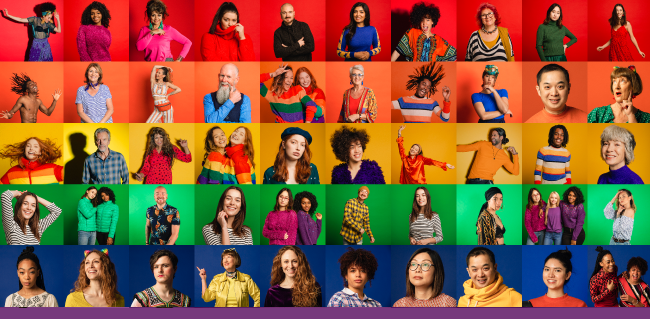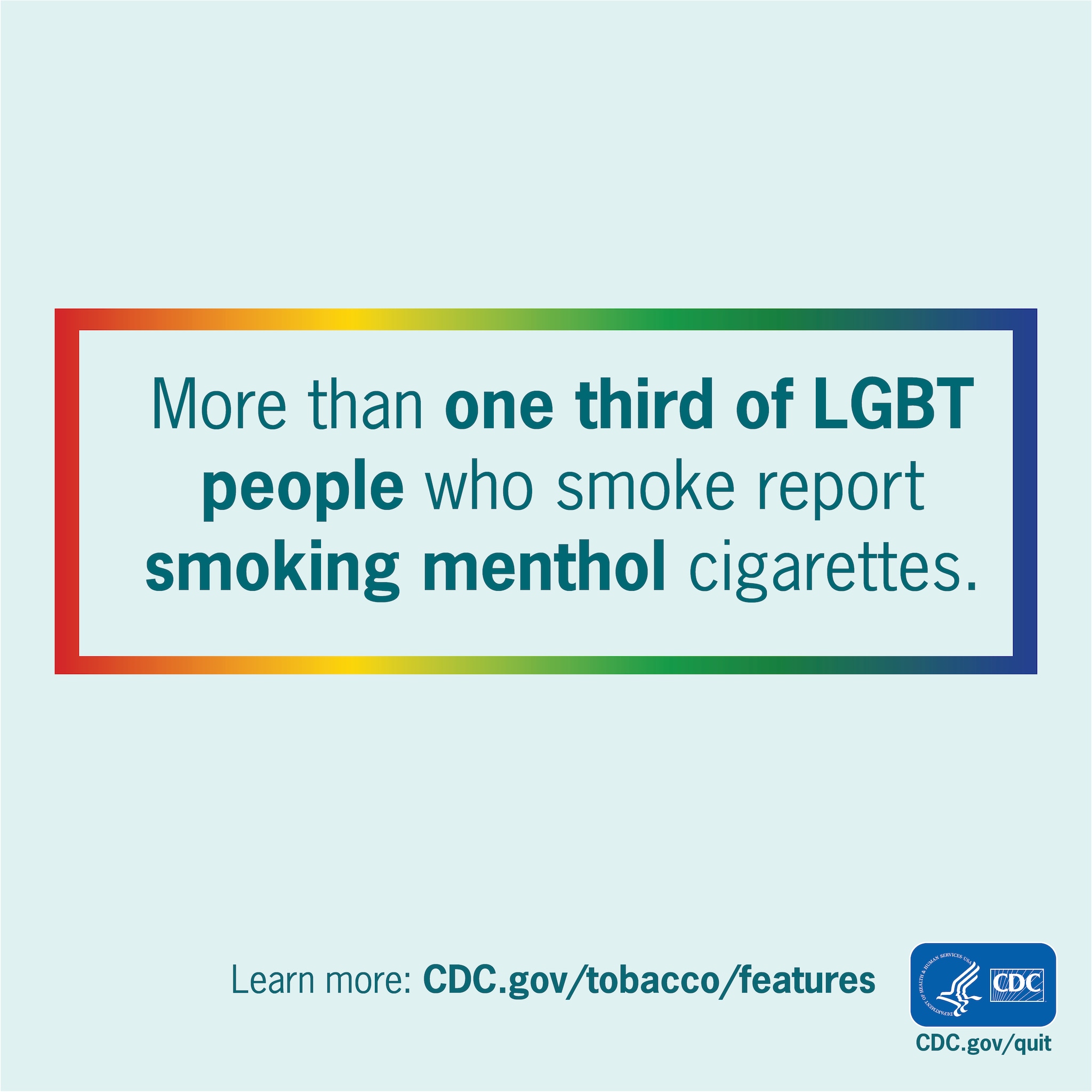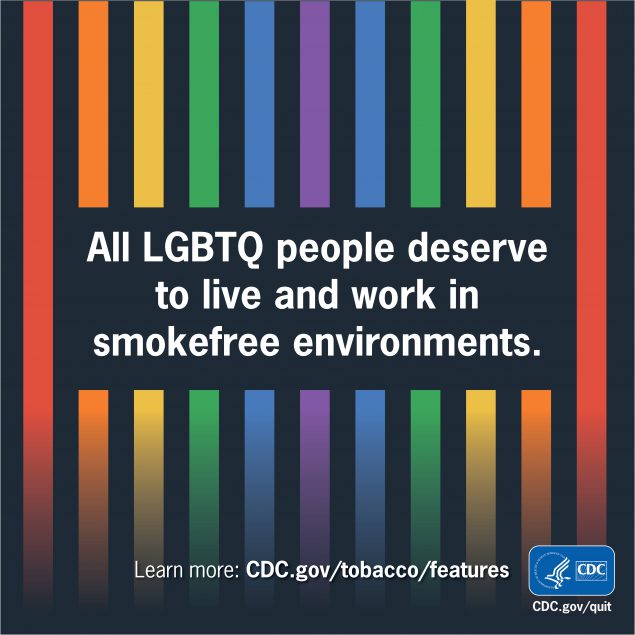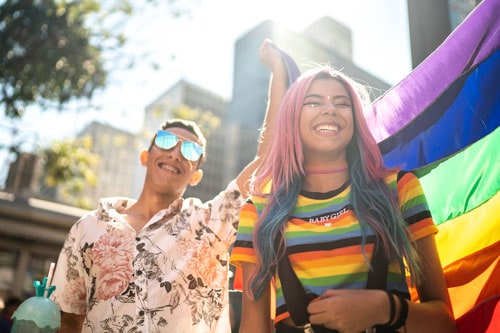Pride Month
An Equal Chance at a Smokefree Life

Ellie N. is a member of the LGBTQ community and loves being around people. She worked in bars that serve LGBTQ communities and noticed lots of people smoking there. Soon, she noticed the toll cigarette smoke was taking on her own health. In her mid-thirties, Ellie was diagnosed with asthma. She never smoked but worked as a bartender in a bar that allowed smoking.
After several hospital visits and on the advice of her doctor, Ellie felt she had no choice but to quit her job and find one where she wouldn’t be exposed to secondhand smoke. Ellie was sad to leave the job she loved, but she knew her health was important and that she deserved to work in a place that didn’t put her health in jeopardy.
Ellie never smoked, but she developed asthma from secondhand smoke exposure. She worked in bars that served the LGBT communities and noticed a lot of people smoking. Ellie loved the work but quit to save her health. In this video, she talks about smoking and how people define their personal identity.

Lesbian, Gay, Bisexual, Transgender, Queer, and Questioning (LGBTQ) Pride Month is celebrated annually in June as a tribute to those involved in the Stonewall Riots; to recognize the impact LGBTQ Americans have had on society; and to advance civil rights, justice, and equitable opportunity for LGBTQ people. This includes equitable health opportunities, like comprehensive smokefree protections for LGBTQ communities. LGBTQ people deserve equitable health opportunities as well, like being smokefree and having smokefree protections. Just like Ellie, all LGBTQ people deserve to live and work in smokefree environments to protect their health.
Everyone deserves an equitable opportunity to live a smokefree life. Smoking cigarettes is harmful to the body and can be hard to quit. In addition, menthol in cigarettes can mask the harshness of tobacco and make it harder to quit smoking. LGBT people are more likely to smoke menthol cigarettes than heterosexual or straight people. Given how menthol interacts with nicotine, people who smoke menthol cigarettes are more likely to continue smoking, which puts them at higher risk of getting tobacco-related diseases.

Cigarette smoking among lesbian, gay, and bisexual (LGB) adults in the United States is higher than among heterosexual or straight people. Sixteen percent of LGB adults smoke cigarettes, compared to 12% of heterosexual or straight adults. In addition, 32.6% of transgender adults report current use of any tobacco product (e.g., cigarettes, e-cigarettes, and cigars) compared to 23.6% of cisgender adults.
About 36% of LGBT people who smoke report smoking menthol cigarettes compared to 29% of heterosexual or straight people who smoke. A survey of LGBT adults during 2009–2010 showed that this difference is even greater among LGBT females (43%) compared to heterosexual females (32%). Similarly, a survey of people aged 12 and older during 2015–2019 showed this difference is also greater among lesbian or gay females (51%) compared to gay males (44%), and among bisexual females (54%) compared to bisexual males (32%).
Smoking prevalence among LGBTQ people may be higher than among non-LGBTQ people for many reasons. One reason is aggressive marketing by tobacco companies that sponsor events, bar promotions, giveaways, and advertisements. Tobacco companies advertise at gay pride festivals and other LGBT community events and contribute to local and national LGBT and HIV/AIDS organizations. Tobacco ads in gay and lesbian publications often show tobacco use as a “normal” part of LGBT life.

While living a smokefree life can mean quitting smoking or not starting to smoke, it also means protecting yourself and others from secondhand smoke, which is smoke from burning tobacco products, like cigarettes, cigars, hookahs, or pipes. Secondhand smoke also is smoke that has been exhaled, or breathed out, by the person smoking. Smokefree laws for all workplaces and public areas protect people who don’t smoke. They also can help people who smoke to quit and can help keep young people from starting to smoke.
These steps can protect you and your family and friends from secondhand smoke:
- Make your home and vehicles smokefree.
- Look for restaurants and other public places that don’t allow smoking.
- Talk to your employer about the benefits of comprehensive tobacco-free policy in your workplace.
- Educate people who make decisions in your community about the benefits of smokefree laws and policies in public places, workplaces, and housing. Tell these decision makers you support businesses going smokefree.
Today, Ellie lives with her partner and works in a smokefree environment. She is very comfortable asking people not to smoke around her, whether they are friends, family members, or strangers. Ellie is emphatic in saying, “Everyone deserves to work in a smokefree workplace.”

This Pride Month, take the step to quit smoking and live a smokefree life. Quitting smoking is one of the most important actions you can take to improve your health. This is true regardless of your age or how long you have been smoking.
Quitting is hard, but it helps if you have a plan. To get started on your quit journey, please visit our Guide for Quitting Smoking.
Help LGBTQ people quit using tobacco products, including menthol products, by:
- Ensuring that all people who use tobacco products have access to evidence-based quitting resources, including counseling and medicines, to help them successfully quit, and tailoring of quit-smoking messages to better reach people who use menthol products.
- Implementing policies that prohibit or decrease sales of menthol tobacco products.
It’s never too late to quit smoking. Quitting smoking improves your health and reduces your risk of heart disease, cancer, lung disease, and other smoking-related illnesses. Over time, people who quit smoking see many benefits to their health.
After you smoke your last cigarette, your body begins a series of positive changes that continue for years. Your heart rate drops, coughing and shortness of breath decrease, and your risk of heart attack, coronary artery disease, and cancers drops. For a complete list of health benefits of quitting smoking over time, visit: Benefits of Quitting.


